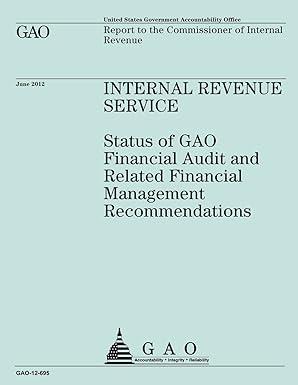Question
1. Thad, a single taxpayer, has taxable income before the QBI deduction of $187,500. Thad, a CPA, operates an accounting practice as a single member
1. Thad, a single taxpayer, has taxable income before the QBI deduction of $187,500. Thad, a CPA, operates an accounting practice as a single member LLC (which he reports as a sole proprietorship). During 2018, his proprietorship reports net income of $150,000, W2 wages of $125,000, and $10,000 of qualified property.
What is Thad's qualified business income deduction?
2. Tammy, a single taxpayer, has a part-time job at BigCo, a company in which she has no ownership interest. In addition, she owns and operates LittleCo, a sole proprietorship that is a qualified trade or business. Tammy is paid wages of $40,000 by BigCo, and reports $100,000 in qualified business income from LittleCo. She has no other items of income or loss and $25,000 of itemized deductions.
What is her qualified business income deduction?
3. Tammy, a single taxpayer, owns and operates LittleCo, a sole proprietorship that is a qualified trade or business. Tammy is paid wages of $40,000 by BigCo, and reports $100,000 in qualified business income from LittleCo. She has no other items of income or loss and $25,000 of itemized deductions.
What is her qualified business income deduction?
4. Susan, a single taxpayer, owns and operates a bakery as a sole proprietorship. The business is not a specified services business. In 2018, the business pays $100,000 in W2 wages, holds $150,000 of qualified property, and reports $350,000 in net income (all of which is qualified business income). Susan has no other items of income or loss and will take the standard deduction.
What is Susan's qualified business income deduction?
5. Susan, a single taxpayer, owns and operates a bakery as a sole proprietorship. The business is not a specified services business. In 2018, the business pays $100,000 in W2 wages, holds $150,000 of qualified property, and reports $150,000 in net income (all of which is qualified business income). Susan has no other items of income or loss and will take the standard deduction.
What is Susan's QBI deduction?
6. Susan, a single taxpayer, owns and operates a bakery as a sole proprietorship. The business is not a specified services business. In 2018, the business pays $60,000 of W2 wages and reports net income of $200,000 (all of which is qualified business income). Susan also has a part-time job earning wages of $11,000 and receives $3,000 of interest income.
What is Susan's tentative QBI based on the W2 Wages/Capital Investment Limit?
Determine Susan's allowable QBI deduction.
Step by Step Solution
There are 3 Steps involved in it
Step: 1

Get Instant Access to Expert-Tailored Solutions
See step-by-step solutions with expert insights and AI powered tools for academic success
Step: 2

Step: 3

Ace Your Homework with AI
Get the answers you need in no time with our AI-driven, step-by-step assistance
Get Started


